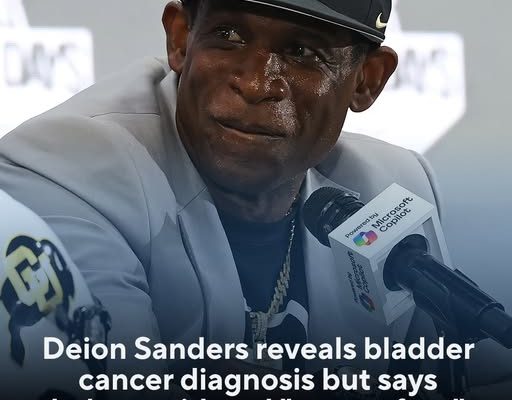Deion Sanders, the charismatic and often polarizing head coach of the Colorado Buffaloes football program, took a deeply human turn on Monday when he publicly revealed his battle with bladder cancer. The emotional moment came during an exclusive sit-down interview with CBS Colorado’s Romi Bean, where Sanders opened up about the challenging diagnosis, the urgency of medical intervention, and the path that ultimately led to a life-changing surgery. As Sanders recounted the events leading up to his bladder removal and the subsequent construction of a new bladder, he showed a level of vulnerability rarely seen from the legendary athlete and larger-than-life coach. In a powerful display of gratitude and trust, Sanders embraced Bean at the end of the interview, a symbolic gesture that transcended the usual relationship between coach and reporter.
Sanders, known widely as “Coach Prime,” has always lived his life in the public eye. From his electrifying NFL and MLB careers to his high-profile rise as a college football coach, few figures in American sports have commanded more attention. Yet despite the countless headlines he has generated, this moment was different. For once, Sanders wasn’t preaching about “dogs in the locker room” or launching into a passionate speech about culture change. He wasn’t wearing his signature sunglasses or playing up his flamboyant personality. Instead, he was stripped of the spectacle, laying bare the physical and emotional toll of a diagnosis that forced him to confront his mortality.
In the CBS Colorado interview, Sanders detailed how the cancer was discovered during what was originally a routine medical examination. His medical team became concerned after reviewing tests that showed abnormalities in his urinary tract. The diagnosis hit hard. After years of struggling with health issues related to blood clots that cost him two toes and nearly his left leg, Sanders was now facing a new and deeply personal battle. According to his doctor, the cancer was localized but aggressive enough to warrant immediate and drastic action. That action came in the form of a complex surgical procedure that involved removing his bladder and constructing a new one using portions of his intestines.
Though the surgery was grueling and the recovery long, Sanders has since been declared cancer-free. His doctor emphasized that there are still risks and that long-term monitoring is essential, but the most immediate danger has been eliminated. In speaking with Romi Bean, Sanders repeatedly expressed a sense of spiritual clarity and divine purpose. He said that his faith in God has only deepened as a result of the diagnosis, and that he views his recovery not just as a personal triumph, but as an opportunity to be a living testimony for others facing similar health struggles. He believes there’s a reason he’s still standing—and coaching.
The embrace between Sanders and Bean captured the depth of the moment. Over the past few years, Bean has covered Sanders closely since he arrived in Boulder in 2022. Through wins and losses, controversies and celebrations, she’s chronicled his impact on a university desperate to rebuild its football legacy. But this wasn’t a story about gridiron tactics or transfer portal acquisitions. It was about the fragile humanity that exists beneath the swagger. As the camera captured Sanders wrapping his arms around Bean, there was a palpable sense that something profound had taken place—not just an interview, but a moment of shared understanding and emotional honesty.
For many in the Colorado Buffaloes program, this revelation has cast a different light on the 2024 season. While Sanders had already been a symbol of cultural and athletic transformation, his fight against cancer has deepened the respect that players, staff, and fans have for him. Sources inside the program say that his approach to coaching has become even more reflective and emotionally charged. One assistant coach noted that “Coach Prime is still Coach Prime—but now he’s walking with an even greater sense of purpose.” Players have reportedly been more locked in during team meetings, and several said privately that they feel an even stronger desire to win not just for the program, but for their head coach.
The broader sports community has also rallied behind Sanders. Messages of support poured in from former teammates, fellow coaches, and fans across the country. NFL stars past and present took to social media to share their admiration for Sanders’ courage. College coaches, even those who have clashed with him in the past over recruiting or media attention, sent words of encouragement. The story touched a nerve—because no matter one’s opinion of Sanders’ style, there’s no denying his impact and influence.
This latest chapter in Sanders’ life adds another layer to an already extraordinary career. As a two-sport professional athlete, Hall of Famer, and pioneering Black head coach at the Power Five level, Sanders has shattered barriers and defied expectations at every turn. Now, he’s doing it again—not by flashing his athleticism or out-coaching his peers, but by confronting a life-threatening disease with courage, transparency, and grace. His willingness to publicly disclose his condition and the details of his surgery stands in stark contrast to the secrecy that often surrounds personal health issues in sports.
Sanders’ decision to go public wasn’t merely about raising awareness—it was about connection. During the CBS interview, he said he wanted to show others that even the strong struggle, that even the seemingly invincible can be brought low by illness. But he also wanted to demonstrate that survival is possible, that faith matters, and that it’s okay to ask for support. It’s a message that resonates well beyond the football field, touching lives in hospital rooms, church pews, and locker rooms alike.
The timing of the announcement, just weeks before the start of the 2025 college football season, also speaks volumes. Rather than using the cancer diagnosis as a reason to step back, Sanders has thrown himself into the preseason grind. He continues to lead team meetings, direct practices, and push his players to believe in themselves and the program. While his energy levels are still recovering and some physical limitations remain, those close to the team say his mind is sharper than ever. In many ways, they say, Sanders is coaching not in spite of his illness, but because of it.
It’s also worth noting that Sanders’ personal health challenges come amid a period of transition for the Colorado Buffaloes. After a rocky 2024 campaign that saw the team struggle against a tough Pac-12 schedule, Sanders has revamped much of the roster through the transfer portal. His son, quarterback Shedeur Sanders, is entering what may be his final season before declaring for the NFL Draft. There’s immense pressure to deliver results, especially now that the team has greater national exposure. But the cancer diagnosis has subtly changed the narrative. Winning remains important, but there’s now a parallel story about resilience, perspective, and the power of the human spirit.
Sanders isn’t asking for sympathy, nor is he looking for accolades. As he told Romi Bean, he simply wants people to understand that everyone—no matter how successful, how famous, or how physically gifted—faces moments of fear and uncertainty. It’s how we respond, he says, that defines us. For Sanders, that response has been rooted in faith, family, and an unshakeable belief in his mission as a mentor and leader. His embrace of Bean wasn’t just a thank-you for a compassionate interview—it was a gesture of solidarity, of shared humanity, of grace under pressure.
As the Buffaloes prepare for another demanding season, their head coach will be on the sidelines, as vocal and visionary as ever. But behind the whistle and the playbook lies a man who has been to the edge and come back. Deion Sanders’ latest chapter isn’t just a footnote in his incredible story—it’s a turning point. And in that embrace, shared on camera but felt far beyond it, he reminded the world that strength isn’t always loud. Sometimes, it’s quiet. Sometimes, it’s soft. And sometimes, it’s in the arms of another, saying, “I’m still here.”



